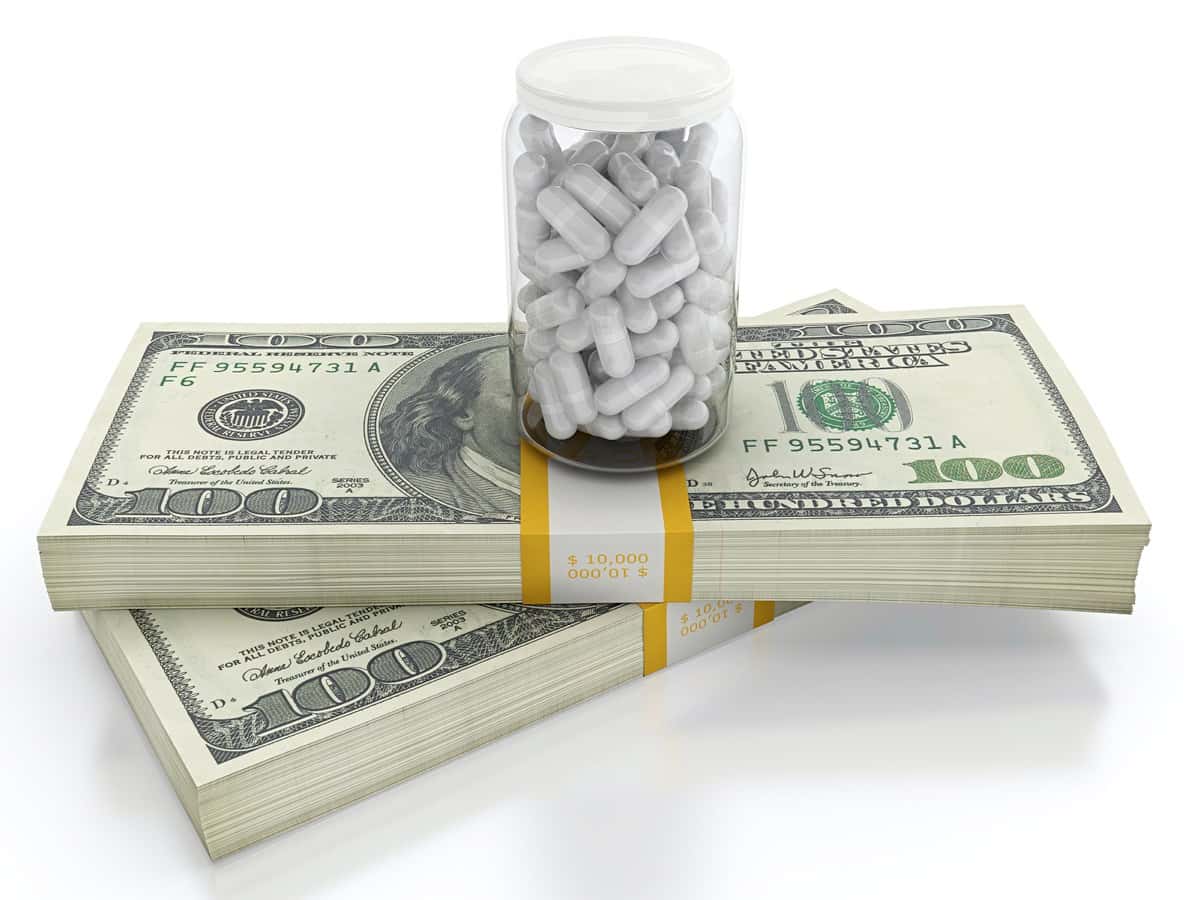
Americans love convenience. That’s why we use drive-through windows at banks, fast food restaurants and even pharmacies. We’re even willing to pay a little more for fast food. People who want to save money make their own lunches and take them to work. Millions more are okay paying a premium to have someone else to make the sandwiches. When you get to the pharmacy, though, are drug companies making a killing on convenience?
Turning Inexpensive Ingredients Into Pricey Pills:
Are drug companies more ingenious than food manufacturers? They have certainly come up with a unique way to turn inexpensive old drugs into a major revenue stream. If Skippy® were to take a $4 jar of peanut butter, add a $3 dollop of grape jelly to it, and then charge $600 for the resulting PB&J, most consumers would be outraged.
We cannot imagine many people falling for that ploy. But they don’t complain about drug companies making a killing with a similar tactic.
Calculating the Cost of Drug Companies Making a Killing:
Dr. Channah Sacks and her Harvard colleagues analyzed the consequences of certain drug combos for Medicare spending (JAMA, Aug. 21, 2018). The question they posed was:
“What is the annual incremental cost to the Medicare Part D drug benefit program of using brand-name combination products instead of their generic components?”
Their conclusions were shocking:
“For the 10 most costly combination products available during the entire study period, the listed Medicare spending could have been an estimated $2.7 billion lower between 2011 and 2016 if the generic constituents had been prescribed.”
Those billions of dollars are taxpayer funds. That’s why we should all be asking: are drug companies making a killing by combining inexpensive generic drugs?
Some Specific Examples:
Fosamax Plus D:
What sorts of medications are we talking about? The investigators found 29 brand-name combination drugs that could readily be replaced by taking two or more generic drugs at the same dose but at a far lower cost.
These are medicines such as the osteoporosis medicine Fosamax Plus D, which contains the bisphosphonate alendronate and vitamin D3. About 2,000 Medicare recipients took this drug in 2016. Between 2011 and 2016, the price of a pill rose by $15.28, which was a 64 percent increase.
Zegerid:
Another example is Zegerid, a medicine for the short-term treatment of ulcers. It contains 40 mg of omeprazole (aka Prilosec) and 1,100 mg of sodium bicarbonate (better known as baking soda). Neither of the ingredients costs very much, yet the price of a Zegerid pill soared 989 percent between 2011 and 2016.
According to www.GoodRx.com, a generic form of Zegerid currently carries an average retail price of $1,732.43 for a month’s supply. The brand name runs around $4,065.98 for the same quantity of pills.
If someone were to buy house brand omeprazole over the counter the cost for 30 pills is around $20. OTC omeprazole comes in 20 mg pills. To equal 40 mg someone would have to take two pills a day. A month’s supply would equal about $40. You can buy one pound of baking soda for as little as $1. There are 454 grams in a pound. That means that at 1,100 mg per day, a box would provide about 440 doses for $1.
No one should ever contemplate doing this without a doctor’s supervision. There is an OTC version of Zegerid. It contains 20 mg of omeprazole and 1,100 mg of sodium bicarbonate. According to www.GoodRx.com, the average retail price for 84 capsules is $52.97.
Who would knowingly pay thousands of dollars for a month’s supply of baking soda combined with a heartburn drug that is available without a prescription? The pharmaceutical firms point out, in their own defense, that hardly anyone does pay full price. Most patients have insurance, although not all insurance plans cover the Rx Zegerid formulation.
In the Drug Companies’ Defense:
We must acknowledge that getting FDA approval for combination drugs can be costly for the pharmaceutical firms. They need to complete clinical trials and fill out tons of paperwork to demonstrate that the “new” medicine is safe and effective. When insurance companies have to cover such medications, they end up charging all their customers higher premiums.
Can People Save Money on Pricey Combination Products?
Could you save money by taking the inexpensive generic drugs separately? We urge people to ask their physicians about this. It should be done only under medical supervision, but it is difficult to imagine that you wouldn’t save money.
True, a single pill is more convenient than two medicines. Hence, a medicine like Duexis (ibuprofen plus famotidine) or one like Vimovo (naproxen plus esomeprazole) can provide pain relief while protecting the digestive tract from irritation.
But how much should you pay for that convenience? Both Duexis and Vimovo cost around $2,900 for a month’s supply, and the prescribing information for Duexis specifies:
“Do not substitute DUEXIS with the single-ingredient products of ibuprofen and famotidine.”
We wonder why not.
How much are you willing to pay for convenience? Share your thoughts about combination drugs below in the comment section. You may also find our eGuide about Saving Money on Medicine helpful.
Citations
- Sacks, C.A., et al, "Medicare Spending on Brand-name Combination Medications vs Their Generic Constituents," JAMA, Aug. 21, 2018, DOI: 10.1001/jama.2018.11439


